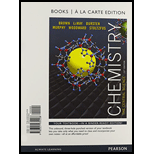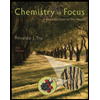
Chemistry: The Central Science, Books a la Carte Edition & Solutions to Red Exercises for Chemistry & Mastering Chemistry with Pearson eText -- Access Card Package
1st Edition
ISBN: 9780134024516
Author: Theodore E. Brown, H. Eugene LeMay, Bruce E. Bursten, Catherine Murphy, Patrick Woodward, Matthew E. Stoltzfus
Publisher: PEARSON
expand_more
expand_more
format_list_bulleted
Textbook Question
Chapter 4.3, Problem 4.7.1PE
Do the reactions involved in ozone depletion involve changes in oxidation state of the O atoms? Explain.
Expert Solution & Answer
Learn your wayIncludes step-by-step video

schedule01:43
Students have asked these similar questions
Questions 4 and 5
For a titration of 40.00 mL of 0.0500 M oxalic acid H2C2O4 with 0.1000 M KOH, calculate the pH at each of the following volume of KOH used in the titration: 1) before the titration begin;2) 15 mL; 3) 20 mL; 4) 25 mL; 5) 40 mL; 6) 50 mL. Ka1 = 5.90×10^-2, Ka2 = 6.50×10^-5 for oxalic acid.
Predict the major organic product(s), if any, of the following reactions. Assume all reagents are in excess unless otherwise indicated.
Chapter 4 Solutions
Chemistry: The Central Science, Books a la Carte Edition & Solutions to Red Exercises for Chemistry & Mastering Chemistry with Pearson eText -- Access Card Package
Ch. 4.1 - Prob. 4.1.1PECh. 4.1 - How are the boundaries between the regions of the...Ch. 4.2 - Air pollution in the Mexico City metropolitan area...Ch. 4.2 - Prob. 4.2.2PECh. 4.2 - Prob. 4.3.1PECh. 4.2 - Prob. 4.3.2PECh. 4.2 - Prob. 4.4.1PECh. 4.2 - Prob. 4.4.2PECh. 4.3 - Distinguish between photodissociation and...Ch. 4.3 - Prob. 4.5.2PE
Ch. 4.3 - Prob. 4.6.1PECh. 4.3 - Prob. 4.6.2PECh. 4.3 - Do the reactions involved in ozone depletion...Ch. 4.3 - Prob. 4.7.2PECh. 4.4 - Prob. 4.8.1PECh. 4.4 - Prob. 4.8.2PECh. 4.4 - Prob. 4.9.1PECh. 4.4 - Prob. 4.9.2PECh. 4.4 - Prob. 4.10.1PECh. 4.4 - Prob. 4.10.2PECh. 4.5 - Practice Exercise 2 The bond energy in N2 is 941...Ch. 4.5 - Prob. 4.11.2PECh. 4.5 - Prob. 4.12.1PECh. 4.5 - Prob. 4.12.2PECh. 4.5 - Prob. 4.13.1PECh. 4.5 - Prob. 4.13.2PECh. 4.5 - The figure shows the three lowest regions of...Ch. 4.5 - Prob. 4.14.2PECh. 4.6 - Where does the energy come from to evaporate the...Ch. 4.6 - Prob. 4.15.2PECh. 4.6 - Prob. 4.16.1PECh. 4.6 - The first stage of treatment at the reverse...Ch. 4.6 - Prob. 4.17.1PECh. 4.6 - Prob. 4.17.2PECh. 4 - Prob. 1DECh. 4 - Prob. 1ECh. 4 - Prob. 2ECh. 4 - Prob. 3ECh. 4 - Prob. 4ECh. 4 - Prob. 5ECh. 4 - Prob. 6ECh. 4 - Which of the following ions will always be a...Ch. 4 - Prob. 8ECh. 4 - Prob. 9ECh. 4 - Prob. 10ECh. 4 - Prob. 11ECh. 4 - List the common products formed when an organic...Ch. 4 - Prob. 13ECh. 4 - Prob. 14ECh. 4 - Prob. 15ECh. 4 - Prob. 16ECh. 4 - Prob. 17ECh. 4 - Prob. 18ECh. 4 - Prob. 19ECh. 4 - Prob. 20ECh. 4 - Prob. 21ECh. 4 - Prob. 22ECh. 4 - Prob. 23ECh. 4 - Prob. 24ECh. 4 - Prob. 25ECh. 4 - Prob. 26ECh. 4 - Prob. 27ECh. 4 - Prob. 28ECh. 4 - Prob. 29ECh. 4 - Explain, using Le Châtelier’s principle, why the...Ch. 4 - Prob. 31ECh. 4 - Prob. 32ECh. 4 - Prob. 33ECh. 4 - Prob. 34ECh. 4 - Prob. 35ECh. 4 - Prob. 36ECh. 4 - Prob. 37ECh. 4 - Prob. 38ECh. 4 - Prob. 39ECh. 4 - Prob. 40ECh. 4 - Prob. 41ECh. 4 - Prob. 42ECh. 4 - Prob. 43ECh. 4 - Prob. 44ECh. 4 - Prob. 45ECh. 4 - 18.85 The main reason that distillation is a...Ch. 4 - Prob. 47ECh. 4 - Prob. 48ECh. 4 - Prob. 49ECh. 4 - Prob. 50ECh. 4 - Prob. 51ECh. 4 - Prob. 52ECh. 4 - The process of iron being oxidized to make iron...Ch. 4 - At 1 atm pressure, CO2(s) sublimes at 78oC. Is...Ch. 4 - Prob. 55ECh. 4 - Prob. 56ECh. 4 - Prob. 57ECh. 4 - Prob. 58ECh. 4 - Prob. 59ECh. 4 - Prob. 60ECh. 4 - Using the standard molar entropies in Appendix C,...Ch. 4 - Which of these statements is true? All spontaneous...Ch. 4 - Prob. 63ECh. 4 - Prob. 64ECh. 4 - Prob. 65ECh. 4 - Prob. 66ECh. 4 - Prob. 67ECh. 4 - What is the temperature above which the Haber...Ch. 4 - Prob. 69ECh. 4 - Prob. 70ECh. 4 - Prob. 71ECh. 4 - Prob. 72ECh. 4 - Prob. 73ECh. 4 - Prob. 74ECh. 4 - Prob. 75ECh. 4 - Prob. 76ECh. 4 - As shown here, one type of computer keyboard...Ch. 4 - 19.3
a. What are the signs of ΔS and ΔH for the...Ch. 4 - Predict the signs of H and S for this reaction....Ch. 4 - Prob. 80ECh. 4 - The accompanying diagram shows how H (red line)...Ch. 4 - Prob. 82ECh. 4 - Prob. 83ECh. 4 - Prob. 84ECh. 4 - Prob. 85ECh. 4 - Prob. 86ECh. 4 - Prob. 87ECh. 4 - Can endothermic chemical reaction be spontaneous?...Ch. 4 - Prob. 89ECh. 4 - Prob. 90ECh. 4 - Prob. 91AECh. 4 - Prob. 92AECh. 4 - Prob. 93AECh. 4 - Prob. 94AECh. 4 - Prob. 95AECh. 4 - Prob. 96AECh. 4 - Prob. 97AECh. 4 - Prob. 98AECh. 4 - Prob. 99AECh. 4 - Prob. 100AECh. 4 - Prob. 101AECh. 4 - Prob. 102AECh. 4 - Prob. 103AECh. 4 - Alcohol-based fuels for automobiles lead to the...Ch. 4 - Prob. 105IECh. 4 - Prob. 106IECh. 4 - Prob. 107IECh. 4 - Prob. 108IECh. 4 - Prob. 109IECh. 4 - Prob. 110IECh. 4 - Prob. 111IECh. 4 - Prob. 112IECh. 4 - Although there are many ions in seawater, the...Ch. 4 - The Ogallala aquifer described in the Close Look...Ch. 4 - Prob. 115IE
Additional Science Textbook Solutions
Find more solutions based on key concepts
14. Each of the following vectors is given in terms of its x- and y-components. Draw the vector, label an angle...
College Physics: A Strategic Approach (3rd Edition)
All of the following processes are involved in the carbon cycle except: a. photosynthesis b. cell respiration c...
Human Biology: Concepts and Current Issues (8th Edition)
41. A reaction in which A, B, and C react to form products is first order in A, second order in B, and zero ord...
Chemistry: Structure and Properties (2nd Edition)
8.63 Two flasks of equal volume and at the same temperature contain different gases. One flask contains 10.0 g ...
Chemistry: An Introduction to General, Organic, and Biological Chemistry (13th Edition)
15. The three masses shown in FIGURE EXI2.15 are connected by massless, rigid rods.
a. Find the coordinates of...
Physics for Scientists and Engineers: A Strategic Approach, Vol. 1 (Chs 1-21) (4th Edition)
What evidence supports the conclusion that the igneous intrusion labeled sill B is more recent than the rock la...
Applications and Investigations in Earth Science (9th Edition)
Knowledge Booster
Learn more about
Need a deep-dive on the concept behind this application? Look no further. Learn more about this topic, chemistry and related others by exploring similar questions and additional content below.Similar questions
- Predict the major organic product(s), if any, of the following reactions. Assume all reagents are in excess unless otherwise indicated.arrow_forwardHow many signals would you expect to find in the 1 H NMR spectrum of each given compound? Part 1 of 2 2 Part 2 of 2 HO 5 ☑ Х IIIIII***** §arrow_forwardA carbonyl compound has a molecular ion with a m/z of 86. The mass spectra of this compound also has a base peak with a m/z of 57. Draw the correct structure of this molecule. Drawingarrow_forward
- Can you draw this using Lewis dot structures and full structures in the same way they are so that I can better visualize them and then determine resonance?arrow_forwardSynthesize the following compound from cyclohexanol, ethanol, and any other needed reagentsarrow_forwardFor a titration of 20.00 mL of 0.0500 M H2SO4 with 0.100 M KOH, calculate the pH at each of the following volume of KOH used in the titration: 1) before the titration begin; 2) 10.00 mL; 3) 20.00 mL; 4) 30.00 mL. Ka2 = 1.20×10-2 for H2SO4.arrow_forward
- Curved arrows are used to illustrate the flow of electrons. Using the provided starting and product structures, draw the curved electron-pushing arrows for the following reaction or mechanistic step(s) Be sure to account for all bond-breaking and bond-making steps Problem 73 of 10 Drawing Amows ro HO Donearrow_forward12. Synthesize the following target molecules (TMs) using the specified starting materials. .CI a) HO3S SM TM b) HO- SMarrow_forwardFor a titration of 20.00 mL of 0.0500 M H2SO4 with 0.100 M KOH, calculate the pH at each of the following volume of KOH used in the titration: 1) before the titration begin; 2) 10.00 mL; 3) 20.00 mL; 4) 30.00 mL. Ka2 = 1.20×10-2 for H2SO4.arrow_forward
- Write the systematic name of each organic molecule: structure name show work. don't give Ai generated solutionarrow_forwardShow work with explanation needed. Don't give Ai generated solutionarrow_forwardA Elschboard Part of SpeechT-D Alt Leaming App app.aktiv.com Curved arrows are used to illustrate the flow of electrons. Using the provided resonance structures, draw the curved electron- pushing arrows to show the interconversion between resonance hybrid contributors. Be sure to account for all bond-breaking and bond-making steps. Include all lone pairs and formal charges in the structures. Problem 45 of 10 I Select to Add Arrows N Please selarrow_forward
arrow_back_ios
SEE MORE QUESTIONS
arrow_forward_ios
Recommended textbooks for you
 Chemistry for Engineering StudentsChemistryISBN:9781285199023Author:Lawrence S. Brown, Tom HolmePublisher:Cengage Learning
Chemistry for Engineering StudentsChemistryISBN:9781285199023Author:Lawrence S. Brown, Tom HolmePublisher:Cengage Learning Chemistry In FocusChemistryISBN:9781305084476Author:Tro, Nivaldo J., Neu, Don.Publisher:Cengage Learning
Chemistry In FocusChemistryISBN:9781305084476Author:Tro, Nivaldo J., Neu, Don.Publisher:Cengage Learning Chemistry: The Molecular ScienceChemistryISBN:9781285199047Author:John W. Moore, Conrad L. StanitskiPublisher:Cengage Learning
Chemistry: The Molecular ScienceChemistryISBN:9781285199047Author:John W. Moore, Conrad L. StanitskiPublisher:Cengage Learning General Chemistry - Standalone book (MindTap Cour...ChemistryISBN:9781305580343Author:Steven D. Gammon, Ebbing, Darrell Ebbing, Steven D., Darrell; Gammon, Darrell Ebbing; Steven D. Gammon, Darrell D.; Gammon, Ebbing; Steven D. Gammon; DarrellPublisher:Cengage Learning
General Chemistry - Standalone book (MindTap Cour...ChemistryISBN:9781305580343Author:Steven D. Gammon, Ebbing, Darrell Ebbing, Steven D., Darrell; Gammon, Darrell Ebbing; Steven D. Gammon, Darrell D.; Gammon, Ebbing; Steven D. Gammon; DarrellPublisher:Cengage Learning Chemistry & Chemical ReactivityChemistryISBN:9781133949640Author:John C. Kotz, Paul M. Treichel, John Townsend, David TreichelPublisher:Cengage Learning
Chemistry & Chemical ReactivityChemistryISBN:9781133949640Author:John C. Kotz, Paul M. Treichel, John Townsend, David TreichelPublisher:Cengage Learning Chemistry & Chemical ReactivityChemistryISBN:9781337399074Author:John C. Kotz, Paul M. Treichel, John Townsend, David TreichelPublisher:Cengage Learning
Chemistry & Chemical ReactivityChemistryISBN:9781337399074Author:John C. Kotz, Paul M. Treichel, John Townsend, David TreichelPublisher:Cengage Learning

Chemistry for Engineering Students
Chemistry
ISBN:9781285199023
Author:Lawrence S. Brown, Tom Holme
Publisher:Cengage Learning

Chemistry In Focus
Chemistry
ISBN:9781305084476
Author:Tro, Nivaldo J., Neu, Don.
Publisher:Cengage Learning

Chemistry: The Molecular Science
Chemistry
ISBN:9781285199047
Author:John W. Moore, Conrad L. Stanitski
Publisher:Cengage Learning

General Chemistry - Standalone book (MindTap Cour...
Chemistry
ISBN:9781305580343
Author:Steven D. Gammon, Ebbing, Darrell Ebbing, Steven D., Darrell; Gammon, Darrell Ebbing; Steven D. Gammon, Darrell D.; Gammon, Ebbing; Steven D. Gammon; Darrell
Publisher:Cengage Learning

Chemistry & Chemical Reactivity
Chemistry
ISBN:9781133949640
Author:John C. Kotz, Paul M. Treichel, John Townsend, David Treichel
Publisher:Cengage Learning

Chemistry & Chemical Reactivity
Chemistry
ISBN:9781337399074
Author:John C. Kotz, Paul M. Treichel, John Townsend, David Treichel
Publisher:Cengage Learning
How to Calculate Oxidation Numbers Introduction; Author: Tyler DeWitt;https://www.youtube.com/watch?v=-a2ckxhfDjQ;License: Standard YouTube License, CC-BY